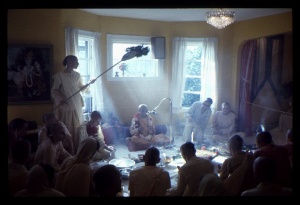SB 10.4.35

A.C. Bhaktivedanta Swami Prabhupada
TEXT 35
- na tvaṁ vismṛta-śastrāstrān
- virathān bhaya-saṁvṛtān
- haṁsy anyāsakta-vimukhān
- bhagna-cāpān ayudhyataḥ
SYNONYMS
na — not; tvam — Your Majesty; vismṛta-śastra-astrān — those who have forgotten how to use weapons; virathān — without chariots; bhaya-saṁvṛtān — bewildered by fear; haṁsi — does kill; anya-āsakta-vimukhān — persons attached not to fighting but to some other subject matter; bhagna-cāpān — their bows broken; ayudhyataḥ — and thus not fighting.
TRANSLATION
When the demigods are bereft of their chariots, when they forget how to use weapons, when they are fearful or attached to something other than fighting, or when their bows are broken and they have thus lost the ability to fight, Your Majesty does not kill them.
PURPORT
There are principles that govern even fighting. If an enemy has no chariot, is unmindful of the fighting art because of fear, or is unwilling to fight, he is not to be killed. Kaṁsa's ministers reminded Kaṁsa that despite his power, he was cognizant of the principles of fighting, and therefore he had excused the demigods because of their incapability. "But the present emergency," the ministers said, "is not intended for such mercy or military etiquette. Now you should prepare to fight under any circumstances." Thus they advised Kaṁsa to give up the traditional etiquette in fighting and chastise the enemy at any cost.